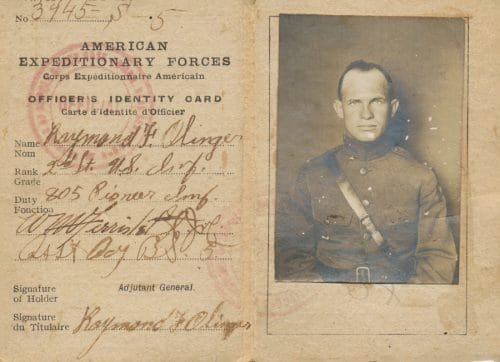 Expeditionary forces identity card of 2nd Lt. Raymond F. Olinger.
Expeditionary forces identity card of 2nd Lt. Raymond F. Olinger.
When the United States entered World War I, my grandfather was recalled to duty from his family’s farm in southeast Kansas. He had served as a regular soldier almost 10 years earlier and so, at 30, was made a second lieutenant assigned to the 805th Pioneer Infantry of the American Expeditionary Forces.
The 805th’s “Regimental History” described shipping out to France: “It was a wonderful night, Aug. 29, 1918, when we departed Camp Funston (Kansas) on our way to take part in shaping the destiny of nations.”
The 805th was a segregated supply regiment of black enlisted men and white officers, often assigned to performing manual labor, assisting engineers at the front and recovering the dead from battlefields. They also fought, and saw 39 days of action in the Meuse-Argonne Offensive — the largest military engagement in U.S. history — where 25,000 Americans died and 90,000 were wounded. Some of the enlisted soldiers in the 805th were made knights of the French Légion d'Honneur but were ignored at home.
My grandfather survived shelling, air raids and a gas attack. Again, the “Regimental History” described what it was like in an understated way: “Nov. 4 found us in a little town called Charpentry that the Germans had wiped off the map. At this place we did fast work, keeping lines of communication open. Long before then, we found out that war was all Old Sherman said it was. We were here Nov. 11, when the armistice was signed. It was a wonderful night.”
Grandfather returned to Kansas after the war but couldn’t make a go of it and in 1927 joined the growing stream of unemployed men drifting west to find work as an itinerant laborer. After seven years of wandering, he returned to his in-laws’ farm, which he managed until 1960.
My own father was 6 years old when he met his father for the first time. By that age, my dad had learned how to work in the fields, in the garden and at school; how to ride and shoot; how to trap and skin rabbits and how to roll his own cornhusk cigarettes. But my dad didn’t know anything about his dad’s wartime service until they were on a train together one day when a black Pullman porter stopped Grandfather to say, “Hello, Lieutenant Olinger.” Grandmother had burned the Army trunk containing his uniforms, souvenirs and letters.
Then there was the story of the black traveler Grandfather had let stay in the house overnight. Grandfather was never able to get work in town after that. That was the real reason he had to leave his family to earn money and why, on his return, he remained a tenant farmer for most of the rest of his life. Or so the story goes.
I heard these stories as a child on sweltering Kansas summer evenings, told by disembodied voices floating from screened-in porches while my cousins and I chased fireflies. Those voices were not immune to the prejudices of their time, or our own, and it’s impossible to pick out truth when it’s so closely entwined with emotion and seen only through the dark glass of memory. All of those voices are gone now, buried under the hard prairie they plowed and planted for so long.
My dad left the farm at 17 when he joined the Army to fight in World War II and later in Korea. When he was dying of lung cancer in 2003, I asked him if he’d had any sense at the time of the difficulties he and his family endured. Dad scowled and shook his head. “It was a good life,” he said.
Nov. 11 was observed as Armistice Day until 1954, when it became Veterans Day in the United States. One honors peace; the other, the soldiers who made peace possible. They mean different things but are perhaps too closely entwined to separate, and perhaps don’t need to be, so long as they are remembered.
My grandfather died when I was 4 years old, but I remember him holding my hand as we walked through his garden, looking for Easter eggs.
UNDERWRITTEN BY THE FUND FOR NONPROFIT NEWS (NEWSMATCH) AT THE MIAMI FOUNDATION, THE ANGEL GUILD, ADVERTISERS, DONORS AND PEOPLE WHO SUPPORT INDEPENDENT, NONPROFIT LOCAL NEWS